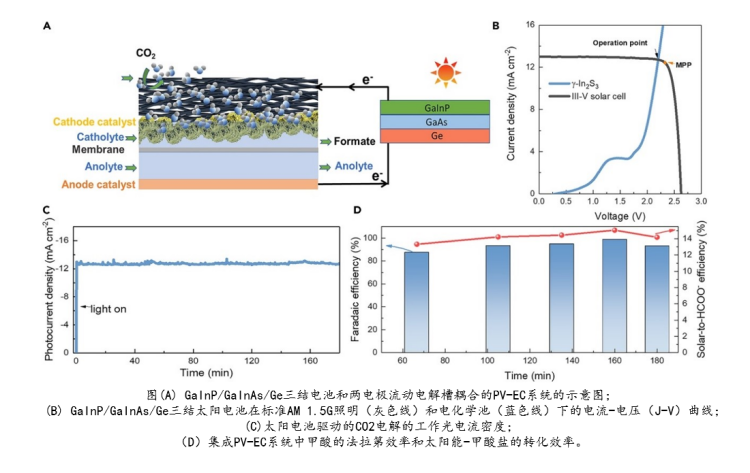NKU Team Makes Important Progress in the Field of Solar Cell-based Artificial Photosynthesis
Recently, the latest research progress made by the team of Xiaodan Zhang and Ying Zhao, professors at Nankai University’s State Key Laboratory of Photovoltaic Materials and Cells, in the field of artificial photosynthesis based on solar cells, was published in Joule, a world-renowned academic journal. Based on the solar cell-driven carbon dioxide electrochemical reduction system, the team achieved record energy conversion efficiency of 14.3% for solar-to-formate.
The rapid deactivation resulting from structural reconstruction and phase transition poses considerable challenges to the artificial photosynthesis system’s durability, particularly at industrially relevant current densities. Here, this work developed a stable hexagonal phase (γ-In2S3) catalyst, which exhibited exceptional selectivity toward formate production with a Faradaic efficiency exceeding 90% across a broad current range from −0.1 to −1.3 A cm−2. When coupled with photovoltaic devices, the constructed artificial photosynthesis system achieved a remarkable solar-to-formate conversion efficiency of 14.3%. This study provides a novel idea for the design of durable catalysts and efficient flow cells in artificial photosynthesis system, and is an effective strategy to realize the synthesis of high-value chemicals and fuels to establish a zero-carbon emission cycle system.

Nankai University is the employer of the first author and the corresponding unit. Qixing Zhang, a postdoctoral fellow at the College of Electronic Information and Optical Engineering of Nankai University; Jing Gao, a postdoctoral fellow at the Swiss Federal Institute of Technology in Lausanne; and Xinjiang Wang, a postdoctoral fellow at Jilin University, are the co-first authors of the paper. Xiaodan Zhang, a professor at Nankai University; Michael Grätzel, a professor at Swiss Federal Institute of Technology in Lausanne; and Lijun Zhang, a professor at Jilin University, are the co-corresponding authors. In recent years, a Nankai University research team has conducted basic research on low-cost catalysts (Nature Communications, 13, 2022; Advanced Materials, 32, 2020; Advanced Functional Materials, 31, 2021) and photovoltaic-driven seawater splitting systems based on perovskite/crystalline silicon tandem solar cell (ACS Nano, 17, 2023).
URL:
https://www.sciencedirect.com/science/article/pii/S2542435124001387?via%3Dihub
(Edited and translated by Nankai News Team.)









